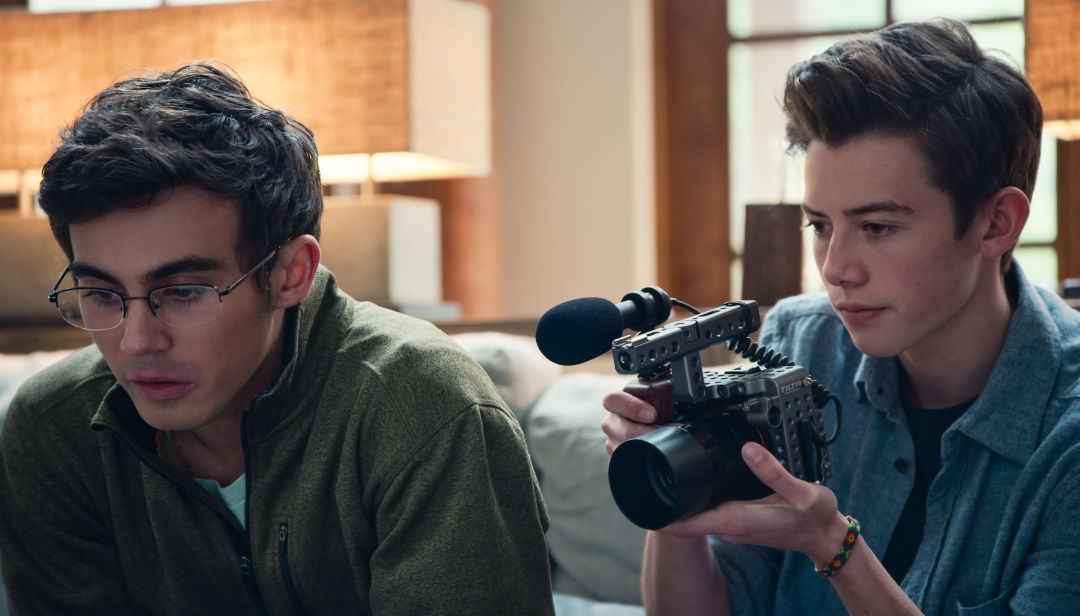American Vandal's Portland-Filmed Season 2 Falls Flat

A still from the second season of Netflix's American Vandal, filmed in and around Portland
Image: Netflix
The 8-episode second season of American Vandal was released on September 14 on Netflix. Shot in and around Portland—the former Washington High School masquerades as the fictional "St. Bernardine" in Bellevue, Washington—this season is vastly less compelling than the former. Beware: spoilers for both seasons to follow.
The critically acclaimed first season revolved around the charmingly dull Dylan Maxwell, a stoner kid who is framed for spray-painting penises onto cars in the faculty parking lot (a.k.a. “doing the dicks”), which totally seems like something he would do. As the season unfolded, Maxwell's character deepened, his motivations evolved, and he and his circle of friends and classmates began to transcend tropes and stereotypes that plague high school students. For a show that revolves around dicks, the final episode struck a surprisingly somber tone. It won a Peabody and, more significantly, the hearts of (dickless) people like me.
This season, our dude in distress is Kevin McClain, a plucky and hilarious weirdo who’d rather vlog about artisanal tea from Japan than converse with his peers. He is joined by high school seniors Peter and Sam—the same duo from season one who were tasked with solving the dick mystery—at an affluent Catholic private school with a championship-laden sports program, where someone has been putting laxatives in the cafeteria lemonade.
Four shitty crimes occur throughout the season, each one more appalling than the next. There's the Brownout, when laxatives are put into the cafeteria lemonade (“which isn’t even made with real lemons!”); the Poop Piñata, which I hope explains itself; and the Shit Launcher, which assails unsuspecting victims en masse with dried cat poop. The final and most heinous crime feels distinctly out of place: the Dump. It doesn’t involve actual poop, but is rather a heavy-handed metaphor for internet privacy. The Dump is a massive leak of hacked info, including a trove of text messages and child pornography, that aims to show the students of St. Bernardine High how truly “full of shit” they are.
Kevin is the prime suspect of this fecal epidemic. But his friend Chloe Lyman believes Kevin is being framed by the real “Turd Burglar.” It’s a clever trick, weaponizing jokes about poop to pose serious questions about humankind (do we rush to convict based on appearances? How objective is our legal system?). And there are some nuanced performances and characters: The treatment of DeMarcus Tillman, the star basketball player, is surprisingly empathetic, adding an emotional depth to the jock archetype. The few female characters (Jenna Hawthorne, namely) are multidimensional and interesting, despite being supporting characters. Jenna is a very wealthy lesbian who smokes pot instead of going to her internship at her dad’s company, and for those reasons alone, she should probably have her own show.
Vandal is still better than a lot of other shows, yet the satire doesn’t always land in this second season. Despite dwelling obsessively on the negative aspects of social media—to wit, the horrors of cyberbullying, catfishing, private and child pornography—the season’s final episode eventually changes its mind, deciding social media is a force for good. In it, Peter argues that social media is a form of “protection” from “the constant state of feedback and judgement” teenagers receive on and offline.
“Imagination is what makes us human,” Peter says. “It allows us to figure out which version of ourselves fits best ... Our existences are simultaneously experienced and curated, presented, packaged, polished, for our own protection.”
It's a logical ending that appeals to our need for closure, yes, but I found it ultimately unsatisfying. Contrasted with the finale of season one—which ended so inconclusively that I found myself grappling with it for weeks after—this neatly cordoned-off ending shutters interpretation entirely. Given the similar “did he or did he not?” setup between the two seasons, it feels like a missed opportunity to make us think. You know, about things other than poop jokes.




